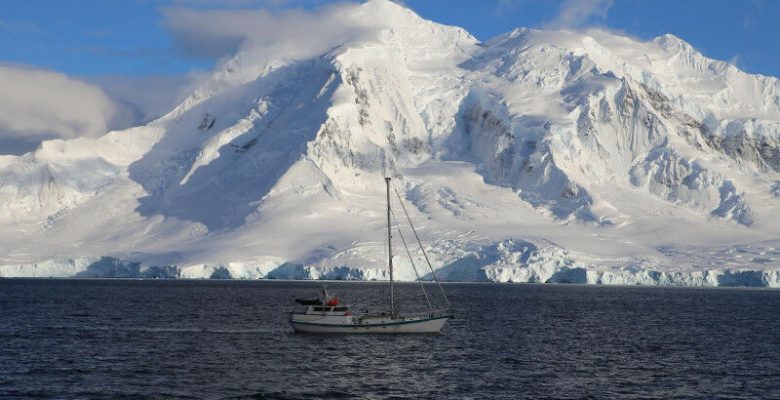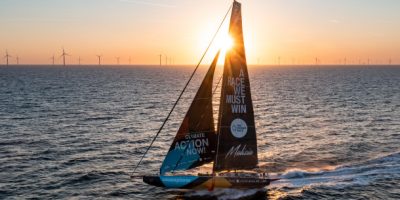As part of the TANGO1 project funded by BELSPO (Belgian Science Policy), nine Belgian researchers from the universities of Liège, Brussels and Ghent are embarking on a sailing boat for the Southern Ocean. For one month, they will collect a maximum number of samples with the aim of better understanding the responses of ecosystems to climate change in this fragile environment.
A research yacht for a committed expedition
On 15 February 2023, nine Belgian researchers left Ushuaïa (Argentina) to reach the Antarctic Peninsula (in the Grandidier Channel), aboard a motor sailing vessel used as a research platform.

Map dated 8 March 2023, showing by a pink circle the position of the sailing ship © Polarsteps
Thanks to this mode of transport, the expedition will have a limited environmental impact with low greenhouse gas emissions and little habitat disturbance during sampling operations. The use of a sailboat also allows the team to be truly agile, and to reach areas that are difficult to access and therefore little studied, yet subject to accelerating environmental pressure.
To carry out their projects, the researchers will use several traditional and more modern techniques: scuba diving, mapping via aerial and underwater drones, 3D imaging, modelling, biodiversity inventories, measurement of matter and energy flows at the atmosphere/ice/sea interfaces, experimental incubations, studies of bacterial symbioses, isotope food webs and environmental genetics.
They take on board an ROV (Remotely Operated Vehicle) type robot, i.e. a sort of remote-controlled submersible drone, which they have learned to master perfectly during a year of training. The ROV is controlled from the sailboat and the images are broadcast directly to the computer, allowing it to be guided in deep waters.

The BlueROV2, equipped with a GoPro HERO 10 – Carrière de Barges © belgica120.be
Every day, the scientific team on board informs us via its blog about the progress of the expedition. The aim is to raise awareness among the general public of the issues involved in this type of research and of those linked to the preservation of the oceans in the face of climate change.
Understanding the stages of change imposed on ecosystems
The TANGO1 mission hopes to help better understand ecosystem responses to climate change in the Southern Ocean, and in particular to try to identify tipping points at which ecosystems can change radically in terms of structure and function.
Bruno Dellile, project promoter for the University of Liège, explains in a statement: “The extent to which transition points are thresholds is not known, but this knowledge is crucial in managing ecosystems to maintain long-term habitability in a context of global change, and for the protection of biodiversity and ecosystem services as part of the natural environment.”
By studying ecological thresholds at different levels of organisation, including species, species interactions, populations, processes and functions, as well as entire ecosystems, with a particular focus on the benthos*, TANGO1 aims to identify not only habitability conditions but also factors that compromise habitability, such as carbon cycle imbalance.
To relive the expedition and listen to the researchers’ reactions, listen to these podcasts by M.-A. Lenaerts.
> Listen to episode 1 link
> Listen to episode 2 link
* Benthos: organisms living in close contact with the sea bed.


